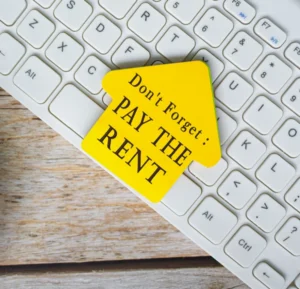HUD Rule Changes Will Ease Housing Barriers for Tenants With Criminal History, Officials Say
 Through updated policies, HUD will require landlords—including public housing authorities like NYCHA, and property owners who accept HUD-affiliated housing vouchers—to take a more holistic approach when vetting potential renters.
Through updated policies, HUD will require landlords—including public housing authorities like NYCHA, and property owners who accept HUD-affiliated housing vouchers—to take a more holistic approach when vetting potential renters.
This story has been updated to include comment from NYCHA.
The Department of Housing and Urban Development (HUD) shared that it will remove barriers preventing formerly incarcerated individuals from securing a home in public housing authorities and other HUD-affiliated properties across the country.
HUD Secretary Marcia Fudge on Monday visited a mixed-use building in West Harlem owned by the Fortune Society, a nonprofit that serves formerly incarcerated New Yorkers, to announce the implementation of a rule to ensure tenants won’t be excluded from housing solely based on their criminal history, among other recommendations.
Through updated policies, HUD will require landlords—including NYCHA, and property owners who accept HUD-affiliated housing vouchers—to take a more holistic approach when vetting potential renters.
“I’m just here to say that of the 80 million people in this country who have an arrest or conviction record, they don’t pose a threat to me or to you,” Fudge said. “They need to be with their families—they need stable housing.”
The ongoing effort ties into National Fair Housing Month, which each April commemorates the enactment of the Fair Housing Act of 1968 that prohibited discrimination based on race, religion, gender, or disability. April is also President Joe Biden’s newly declared “Second Chance Month,” dedicated to formerly incarcerated individuals who are reentering society.
Last year, Fudge announced that HUD would conduct a department-wide assessment of its regulations and documents for the purpose of weeding out language that may exclude returning citizens from being approved for housing.
After a six-month review, HUD suggests public housing authorities and HUD-affiliated developments not deny housing to eligible renters “simply based on the presence of a criminal conviction,” to consider the amount of time since a conviction or arrest, and allow formerly incarcerated individuals to provide evidence that proves their improvement and stability.
The guidance is similar to legislation passed by state lawmakers last year, which prevents NYCHA from rejecting tenants “on the sole ground that such person is a formerly incarcerated individual”—though critics of that bill said it would have little impact, Gotham Gazette reported at the time, since NYCHA considers past convictions as a basis for tenant eligibility, not past incarceration.
In NYCHA, an application for a public housing unit can be denied for individuals who have misdemeanor and felony convictions. Their status of eligibility can range from three to six years after release, not including probation or parole, depending on the type and severity of the conviction. Denials can be appealed if an applicant can prove rehabilitation.
 The housing authority also enforces a permanent exclusion policy which prevents people who commit “dangerous conduct” such as assault, murder and drug dealing from residing or visiting the NYCHA property they are associated with.
The housing authority also enforces a permanent exclusion policy which prevents people who commit “dangerous conduct” such as assault, murder and drug dealing from residing or visiting the NYCHA property they are associated with.
In a statement, a NYCHA spokesperson described the housing authority as “a leader in the adoption of a more progressive and modern approach to criminal justice,” and pointed to its Family Reentry Program, which grants returning tenants who’ve been recently released from prison or jail short-term permission to reside on NYCHA property. Once they complete the program, which connects them to educational and employment opportunities, they have the chance to be permanently added to an existing lease.
“Furthermore, NYCHA is implementing an approved set of criminal justice policy reforms, including a holistic admissions screening process, where NYCHA applicants with past criminal justice involvement are reviewed by a panel before receiving an ineligibility determination,” the spokesperson added. “We look forward to continuing to build on this progress and remain committed to complying with any new requirements set forth by HUD relating to this important matter.”
While finding housing in New York City is always tough, tenants with criminal records—who make up approximately 11 percent of the city’s adult population—face even greater hurdles to securing a place, often cycling back and forth between homeless shelters and incarceration.
In recent years, the NYC Council has considered wider-reaching legislation that would make it illegal for landlords and realtors to factor in criminal backgrounds when considering a tenant, though critics have pushed back against the bill, citing public safety concerns.
Stanley Richards, the deputy CEO of the Fortune Society, said about 20 percent of participants enrolled in the non-profit organization’s programs identify as homeless or unstably housed.
The group’s Castle Gardens development, where the HUD announcement took place, provides transitional housing for people with criminal justice backgrounds and includes 114 units, an onsite computer lab, a counseling center and an outpatient drug treatment service.
“Each year we serve about 10,000 people coming through the system who are seeking an opportunity to rebuild their lives, regain their family connections and to live a life that is thriving,” Richards said.
HUD said that along with removing barriers, the department will also support reentry programs and partnering public housing authorities with services like counseling and legal aid to reduce homelessness.
Christina Johnson, a case manager at the Fortune Society, had first-hand experience getting rejected by NYCHA due to her prior conviction. Released from prison in 2016 after serving a three-year sentence, she struggled to find a home for herself and her now 4-year-old son.
That was until June 2020, when she received a phone call from NYCHA informing her that she was approved for a one-bedroom apartment in Brooklyn.The next step was for Johnson to pay $1,861, which included the first month’s rent and a security deposit.
“I gladly gave the money order in for the entire amount,” said Johnson. “It was really happening.”
Then, there was silence.
At first, Johnson thought the hold was only due to the apartment not being move-in ready. But later that month, she learned her status on the NYCHA portal had changed to “pending eligibility”—Johnson’s past conviction, from her teenage years, had affected her qualification.
Her money order was returned soon after and she was told there was nothing further she could do. “Apparently I was red flagged and I was told I had no grounds for an appeal,” Johnson said. “They said they had made a mistake during the background check and I never should have been deemed eligible.”
With the help of Fortune Society, Johnson overturned her status and is now eligible for a NYCHA apartment—otherwise, the 27-year-old would have been ineligible for a unit under the housing authority’s rules until 2027.
“I am a lucky one, not everyone is,” Johnson said. “No one should have to go through that.”
Source: citylimits.org













 Accessibility
Accessibility